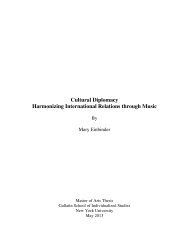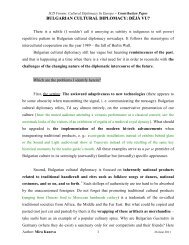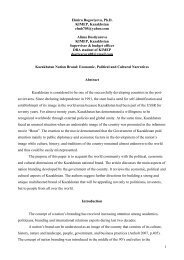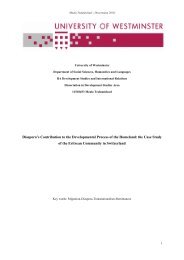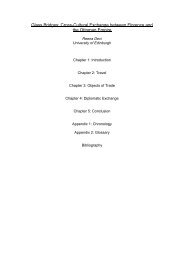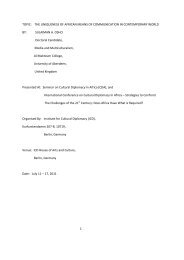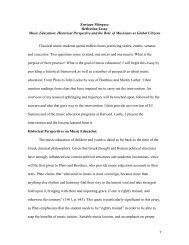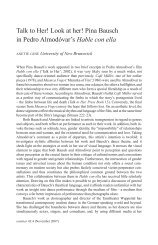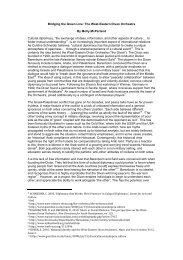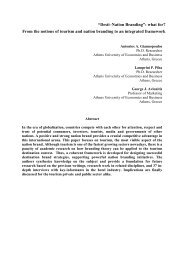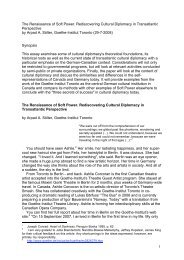Country Profiles: Germany - Institute for Cultural Diplomacy
Country Profiles: Germany - Institute for Cultural Diplomacy
Country Profiles: Germany - Institute for Cultural Diplomacy
Create successful ePaper yourself
Turn your PDF publications into a flip-book with our unique Google optimized e-Paper software.
4. Historical Overview since World War II<br />
The legacy of World War II has had a profound effect on the German state <strong>for</strong> decades.<br />
Especially in the period directly following the reestablishment of the democracy in <strong>Germany</strong> in<br />
1949, the Federal German Republic (FGR) was very focused upon reintegrating into the<br />
world community by adhering to civilian power norms and values. Since then, the government<br />
has invested heavily into cultural programmes, recognizing them as a way to promote<br />
diversity and openness within the FGR as well as improving its image abroad. Within <strong>Germany</strong>,<br />
cultural diplomacy between different communities did not play a very important role until<br />
recently. The arrival of many guest workers from Turkey, Italy, Yugoslavia, Greece, and other<br />
Mediterranean countries in the 1960s brought about significant changes in the FGR’s cultural<br />
landscape. Since they were not expected to stay in the long run, the German government<br />
did not see the need to improve its integration policies. Similarly, projects centred on<br />
cultural diplomacy aimed at improving understanding between cultural groups were not very<br />
common until after reunification.<br />
<strong>Cultural</strong> diplomacy abroad has been a priority of the FGR since the very beginning. During<br />
the Cold War, programmes focusing on cultural diplomacy helped cement ties between<br />
<strong>Germany</strong> and allied nations, notably the United States and France. Unlike cultural<br />
diplomacy pursued by the Nazi regime, these new ef<strong>for</strong>ts focused on promoting openness,<br />
tolerance, and democratic values among people. <strong>Cultural</strong>ly diplomatic programmes abroad<br />
were able to re-establish ties that had been severed between the people of <strong>Germany</strong> and<br />
those of its <strong>for</strong>mer enemies. Exchange programmes between French and German youth, <strong>for</strong><br />
example, paved the way <strong>for</strong> less animosity between these populations.<br />
Using soft power means such as cultural diplomacy was a very clear signal to the outside<br />
world that the FGR eschewed the hard power tools used by the Nazi regime and was<br />
willing to be integrated into the world system. Furthermore, cultural diplomacy abroad gave<br />
the FGR a much-needed image boost. It enabled others to learn more about its culture and<br />
society as a way of showing them those aspects of <strong>Germany</strong> that were so often<br />
overshadowed by its dark past. <strong>Cultural</strong> diplomacy with an external focus was the best way<br />
to improve relations between its peoples and those of allied countries, which led to improved<br />
relations between the governments of those countries.<br />
The German Democratic Republic (GDR) also utilised cultural diplomacy. However, unlike the<br />
FGR’s programmes, the GDR’s programmes sought to signal to its allies, notably the Soviet<br />
Union, its continued support <strong>for</strong> and belief in the values of socialism, rather than its support<br />
<strong>for</strong> the values of democracy and the West. <strong>Cultural</strong> diplomacy with fellow socialist countries<br />
took the <strong>for</strong>m of student or artistic exchanges. The few programmes conducted in the area of<br />
cultural diplomacy the GDR towards the FGR, or the non-socialist world, were mainly focused<br />
on sporting competitions. Also, the GDR employed many migrant workers (Gastarbeiter),<br />
mainly from Vietnam, Cuba, Mozambique, Poland and Angola. They had a limited work stay<br />
and lived in particular housing developments. There happened to be no integration due to a<br />
lack of knowledge of the German language, furthermore the GDR government did not<br />
encourage contact between the different cultures.<br />
The programmes discussed below show different examples of cultural diplomacy programmes<br />
conducted by German institutions either in <strong>Germany</strong> or abroad.



